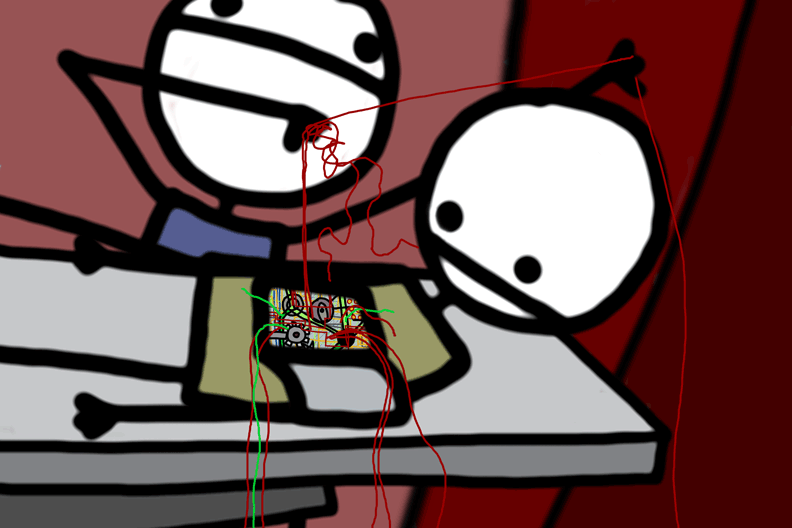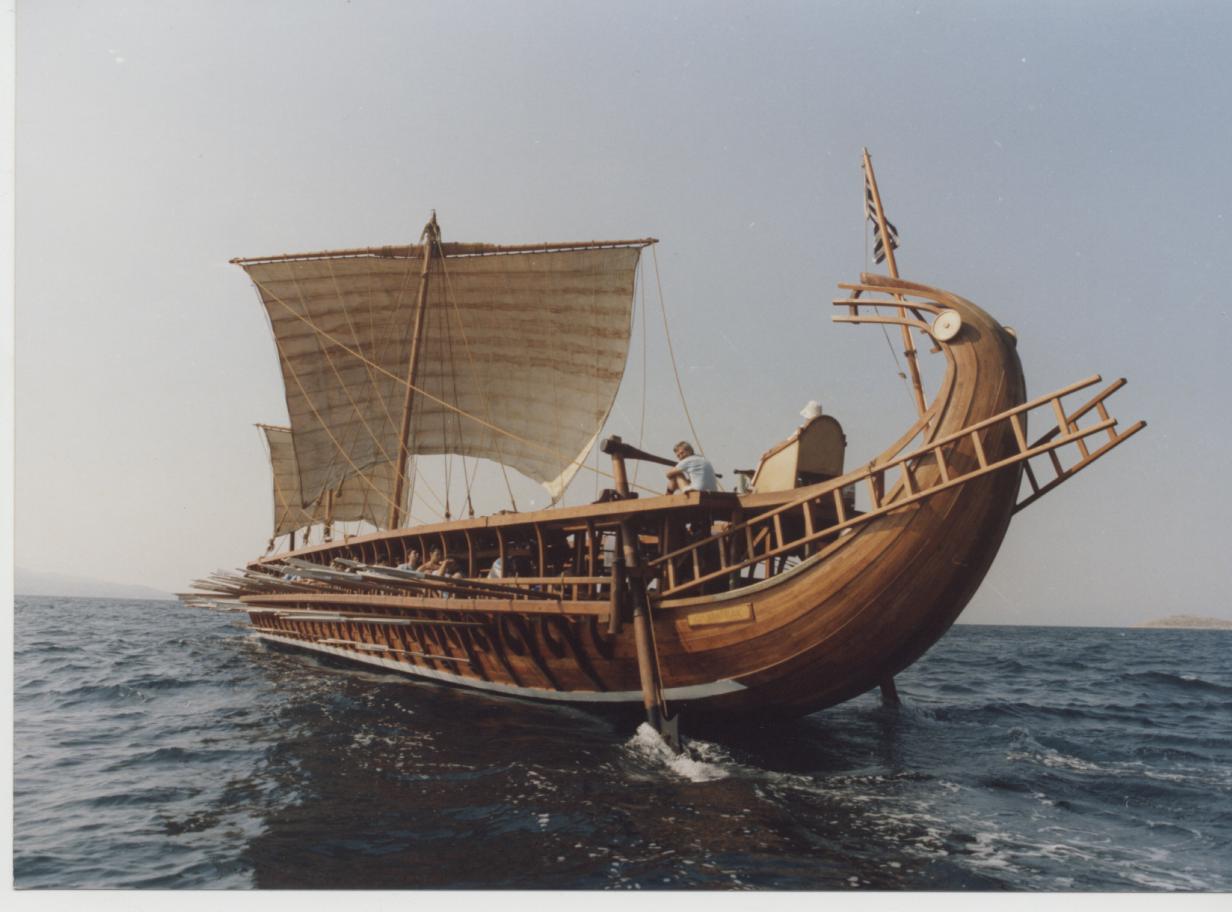What Is Personal Identity?
Questions about personal identity are questions about what the identity conditions for persons are. Questions about when we have a case of one and the same person, and when we don't.
You are one and the same person as the five-year-old who broke your mother's vase. (Of course, you are qualitatively different from that five-year-old; but you are numerically identical to him or her.) What makes you the same person as that five year old? What makes you a different person from the guy sitting next to you? To answer these questions is to say what your identity conditions are. That is the topic of the next section of this course.
One way of figuring out what your identity conditions are is to ask what sorts of changes could you "survive"? What sorts of changes would be ones where it's still you who is left around afterwards, and what changes would bring your existence to an end?
- Presumably, one kind of change you can survive is getting a haircut. (Some will object: "But I'm not the same after getting a haircut!" To which the reply is: Yes, you are qualitatively different after getting your hair cut. But you are still one and the same person. There is one person whose hair was long and now is short. The barber didn't cause anybody to cease to exist.)
- Another kind of change you can survive is having your heart replaced. Every year many people get their hearts replaced with new ones. They don't view it as a form of suicide. It is a momentous qualitative change to undergo; but they don't view the heart transplant as a way of causing themselves to cease to exist. They think that if the transplant goes smoothly, then the person they are will still continue to exist, after the operation. If they're right, then one can still be one and the same person, after having one's heart replaced.
For the next few weeks, we'll be looking at some more radical kinds of changes, and asking whether these are changes you could survive: whether you would still be around after these changes took place. For instance, recall the thought experiment I mentioned at the start of term:
-

sam brown, explodingdog
If all your thoughts and experiences are implemented by certain neural patterns in your brain, what would happen if we read off those patterns and fed them into an artificial computer brain? We could then place that artificial brain into a new body.
In past weeks we've been concerned with the question: would the creature with this artificial brain be a real thinking thing, would it have a genuine mental life of its own? Now we're going to be focusing on the question: supposing it would have a genuine mental life, would this creature be you? Or would it instead be a new person with the same thoughts and memories as you?
If you don't think the artificial brain would really be thinking when we fed your brain patterns into it, then you can suppose instead that we "erase" the patterns from some other human brain, and feed your patterns into that human brain. Then we can ask the same questions: will the creature who gets this new brain be you? Our a new person who just happens to have the same thoughts and memories as you?

Ship of Theseus
A useful way to begin tackling questions of personal identity is by considering the Ship of Theseus. This is a famous philosophical example, dating back to ancient times. Theseus was an Athenian hero who sailed to Crete, defeated the Minotaur, rescued some Athenian captives, and sailed them back to Athens. In his honor, the Athenians preserved the ship, and used to sail it around on parade once a year. Over time, however, various bits and pieces of the ship needed repairing. No problem. They just found some new parts, shaped just like the old parts and made out of the same materials, and made the repairs. It seems plausible that it was still one and the same ship, even after some repairs of this sort were made.
Now suppose that over time, every part of the ship eventually gets replaced in this gradual, piecemeal way. Is it still one and the same ship? Here it seems a bit more problematic than before to say it's the same ship. But we might persuade ourselves that, since the replacements were all gradual and piecemeal--and since it doesn't appear like any one of the replacements caused the original ship to cease to exist, and a new ship to spring up in its place--that yes, this is still the same ship as the Theseus' original ship. Of course, it has undergone some qualitative changes. But that was also true of the ship when Theseus still owned it. Back when Theseus owned the ship, it was constantly getting wet, having pitch applied to it, and even having parts replaced. That's the ordinary course of events for a ship.
Now let's add a new twist to the story. Suppose that one enterprising Athenian collects all the discarded parts of the original ship. As time goes by, his collection accumulates, until eventually he has all the pieces of the original ship. Now he carefully puts these pieces together, according to the design of the original ship. Next time the annual "Ship of Theseus Parade" comes around, he brings out his ship and bills it as the real Ship of Theseus! The other Athenians are dismayed. They thought that the ship they had been carefully repairing all of these years was the Ship of Theseus.
Who is right? Which ship is one and the same as the original ship? The carefully repaired ship? Or the ship built out of all the discarded pieces?
This puzzle raises a number of interesting issues about the identity of ships and other human artifacts over time. Can an object survive the replacement of some of its parts? Can it survive the gradual, piecemeal replacement of all of its parts? Can it survive being disassembled and rebuild according to its original design? (As the ship built out of the discarded pieces purports to have done.) And so on. Some of these questions go beyond what we can pursue in this class. But other questions raised by the Ship of Theseus puzzle have counterparts for persons.
-
When we investigate what the identity conditions for persons are, we'll be relying on some thought-experiments in which we have to make assumptions about whether a certain body or brain has remained one and the same thing over time. Bodies and brains, like other material objects, are gradually losing molecules and having those molecules replaced, as time goes by. So there are also interesting questions about what makes bodies and brains preserve their identity over time. However, we won't be able to look into those questions. We can't try to answer every interesting philosophical question in this class!
When thinking about the Ship of Theseus, and about identity conditions for persons, it is important to keep epistemological questions separate from metaphysical questions. The metaphysical question here is: What would make this one and the same ship (or person) over time? The epistemological question is: How can we tell whether or not this is the same ship (or person)?
These questions are related. In particular, the way we answer the metaphysical question will make a big difference to how we should answer the epistemological question. Nonetheless, they are different questions, and it is important not to confuse them. For instance, suppose that we decide to answer the metaphysical question by saying that, if the new ship is built out of all the same planks and pieces as the original ship, then they are one and the same ship--even if the ship has been disassembled in the meantime. In that case, we would still be left with the question, How can we tell whether these are the same ship? How do we go about determining whether or not the new ship is built out of all the same planks and pieces as the original ship?
Similarly, when we're talking about whether it would be possible to "store" your personality on tape, and then revive you in a new body, or as a sentient computer, we also need to distinguish the metaphysical questions:
Could such-and-such an individual be the same person as you? What would make it the case that he or she was, or was not, the same person as you?
from the epistemological questions:
Who would be able to tell? How would they know?
If some of the crucial evidence gets lost, it might be that some future person is the same person as you, even though no one (including you) is in a position to know this.
As with the Ship of Theseus, here too the metaphysical questions and the epistemological questions are closely related. The way one answers the metaphysical question will make a big difference to how we should answer the epistemological question. Nonetheless, they are different questions, and it is important not to confuse them.
Conventionalism
One view about the Ship of Theseus is that there is no answer yet to the question which ship is identical to the original ship. There is no answer yet because our concept of a ship hasn't been designed to give answers to problem cases of that sort. But we can just decide to extend our concept of a ship, in either direction. We can decide to call the carefully repaired ship the same ship as the original. Or we can decide to call the ship built out of the discarded pieces the same ship as the original. It's up to us.
We will not address the merits or demerits of this view as a view about ships. However, we will be concerned with whether this is a satisfactory line to take on questions about personal identity.
The next thing we'll do is look at a few problem cases. We'll see that the conventionalist response to these problem cases is intuitively pretty unsatisfactory.

